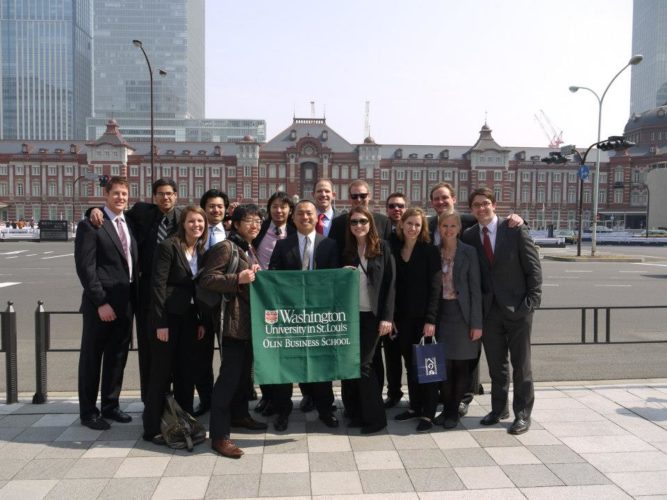Right now St. Louis is a hotspot for entrepreneurial activity. Kiplinger magazine named it one of the top 10 cities for entrepreneurship. Forbes Magazine recently ran an article on the local entrepreneurial community, saying St. Louis has emerged as a new leader in tech startups and innovation. In 2010, venture capital investments in St. Louis DOUBLED. They’ve gone up steadily ever since.
It’s clear that St. Louis is the new place to be for anyone interested in entrepreneurship, venture capital or technology.
Olin students have an incredible opportunity to be a meaningful part of the St. Louis startup community. We have students working hand-in-hand with startups, researching deals for venture capital firms, and starting their own companies, all before they graduate.
As a local entrepreneur, Olin graduate, and Olin entrepreneurship professor, I realized that one way to encourage the entrepreneurial growth in St. Louis was to combine and leverage resources from on and off campus.
Last year, I had the opportunity to join Cultivation Capital as a general partner and have taken advantage of the opportunities to build these connections. 
In less than a year from the fund’s inception, we have invested in eight incredible St. Louis startups, infusing $6 million dollars into St. Louis based startups like LockerDome, Yurbuds, Aisle411, and FoodEssentials. Every step of the way, we’ve found opportunities for Washington University students to get involved– either by working directly with our portfolio companies or by helping conduct research and due diligence on potential investments.
One of the biggest developments we have seen in the fund is the growth of LockerDome. MarketWatch recently called the St. Louis company, “Facebook on sterroids.”  We agree. Cultivation Capital stepped up as an early investor in the sports-based social media platform. The user growth was explosive. In fact, the growth was so incredible that it became clear LockerDome was ready for a major round of funding.
We agree. Cultivation Capital stepped up as an early investor in the sports-based social media platform. The user growth was explosive. In fact, the growth was so incredible that it became clear LockerDome was ready for a major round of funding.
Cultivation Capital general partner Brian Matthews and I led the founding of a new later-stage fund, Cultivation Capital Growth Fund, in order for Cultivation Capital to lead a $6 million dollar Series A funding round into LockerDome. After Brian and I managed the negotiations and structuring of the deal, I joined the LockerDome board. The quick closing of this investment would have not been possible without the help of students from my Venture Consulting course at Olin. Mark Gillis, Karthik Karthik, Jacob Zax and Noah Mullin, did the due diligence to set the evaluation for the round. We are incredibly excited to see what LockerDome Founder Gabe Lozano, LockerDome CFO Mark Lewis (an Olin MBA alum and adjunct faculty member), and their team will be able to accomplish in the next few months. (Watch video featuring Lockerdome CEO and Olin students.)
Also on Cultivation Capital’s radar is the newest addition to our portfolio, FoodEssentials. FoodEssentials is a data-driven company developing best of breed technologies to solve problems related to food label information for consumers, manufacturers, retailers, and the government.EVP Product & Strategy
Ronak Sheth, an Olin EMBA graduate, serves as the EVP Product & Strategy of FoodEssentials and is part of an all-star team from around the globe. Our decision to invest was largely influenced by the work of quite a number of hard working Washington University students. Jay Hong and Geoff Stonner put together a market and competitive analysis for FoodEssentials through the new CELect class that I teach with Ron King. Yoonkee Sull, Sunil Srivatsa, Ryan Rakestraw, Harry Bolson, Kasey Joyce, and Brian Howley were all on Cultivation’s due diligence team for this investment.
That is what is so incredible about St. Louis right now. We have companies on the cutting edge of technology and innovation. We have millions of dollars of investments being put to work. We are getting national and international attention for the companies that are emerging and developing in St. Louis. And Olin students are right at the heart of the action.
Stay tuned for more updates on what’s going on at Cultivation Capital and at the intersection of entrepreneurship in St. Louis….
-Clifford Holekamp,
Senior Lecturer in Entrepreneurship and Director of the Entrepreneurship Platform
Kasey Joyce, MBA’14 and incoming President of the Olin Entrepreneurship and Venture Capital Club contributed to this blog post.
Top photo: Olin students network with local startups at Cultivation Capital’s “Cultivation Connection” event in March.





